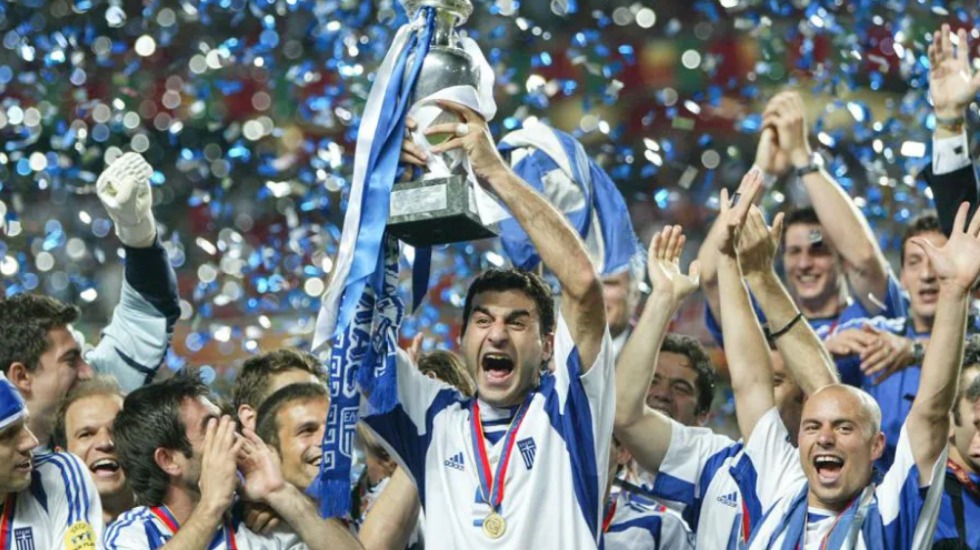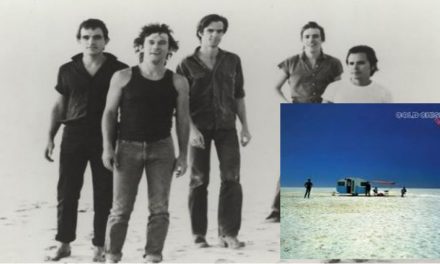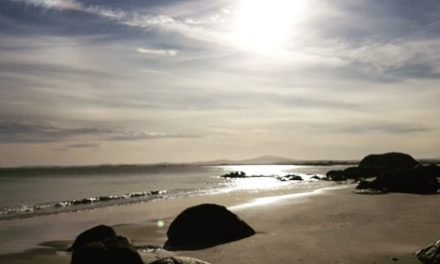Defender Traianos Dellas lifts the trophy aloft after Greece’s ultimate underdog victory in the Euro 2004 final. Photo: GETTY IMAGES
There are some things in life you never forget.
In the European summer of 2004, I set off to Greece to learn more about my family history.
It would be an emotional pilgrimage that took me from one side of the country to the other; from Odysseus’ rugged homeland Ithaca, to Rhodes, the jewel in the Dodecanese.
This journey came about because I never knew my maternal grandmother. I wanted to hear her story firsthand. Against her wishes, she followed her husband to Australia in 1939 where he promised her “a better life.” It didn’t turn out like that for my Yiayia. Her migration experience was full of sadness and tragedy; she gave birth to four children, two got sick and died, and she was left to mourn, alone in a strange place. Yiayia went back to Greece and died a broken woman.
I knew this trip was going to throw up many confronting emotions, what I didn’t know (and didn’t see coming from a million miles away) was that I was soon to be engulfed in one of the most joyous moments of my life.
My trip coincided with the UEFA European Football Championship in Portugal.
The mood in Athens was subdued, and for good reason. Greece was a 150-1 outsider to win. As proud as we Greeks are about our achievements (just in case you didn’t know, we invented everything), Greece viewed its national football team as a bit of an embarrassment.
Greece had only ever been to two major tournaments before 2004 (Euro 1980 and the 1994 World Cup) and it hadn’t won a game at either of them – and its sum total of goals scored was … one.
Most people, especially the Greeks, thought the miracle of this tournament was the fact that they had actually qualified. No one seriously expected Greece to win a game in its ‘group of death’, let alone navigate its way out of the group stage.
As a result, I didn’t pay too much attention to the build-up to Euro 2004, the general feeling in Greece was let’s hope we don’t get humiliated.
Seven minutes into the opening match against host nation Portugal, all that changed. We scored. What’s even more remarkable is that we actually went on to win the match 2-1.
During the opening ceremony before the game, a replica of a 16th-century ship was used to show the expeditions of the Portuguese explorers. While broadcasting the match against Portugal, Greek radio sports journalist Georgios Helakis commented that, “Since the Portuguese team appeared in such a ship, it’s time for us to become pirates and steal the victory.”
After the win, the team had a new nickname, To Piratiko, meaning ‘The Pirate Ship’ – and suddenly the whole country was onboard!
Next, we held former champions Spain to a 1-1 draw.
PLEASE HELP US CONTINUE TO THRIVE BY BECOMING AN OFFICIAL FOOTYOLOGY PATRON. JUST CLICK THIS LINK.
Greece lost its final match against Russia but it didn’t matter – To Piratiko had done the unthinkable and qualified for the knockout stages.
The shame of past performances had been replaced by a strange sensation. Pride.
I watched the quarter-final against tournament favourite France in the harbour town of Vathy on Ithaca, my father’s island. The plateia was bustling with a mixture of locals and priests, all joined together in prayer.
In the 65th minute Angelos Charisteas broke the deadlock. The square descended into madness. Ouzo flowed. Prayers were answered as Greece held on to win. There were more tears. And more Ouzo.
The next stop was a semi-final against the Czech Republic. By this time, I had taken to wearing the goat’s horn of Amalthea around my neck. And by now, I truly believed it would ward off the evil eye and help us beat the Czechs.
Deep into the first period of extra time, defender Traianos Dellas headed home a corner. Dellllllllaaaaaaaassssssss!
Greece had qualified for the final of Euro 2004.
July 4th, 2004. Omonia Square, Athens. I’m squashed in the middle of the world’s largest mosh pit. One pair in an endless sea of glistening eyes transfixed on the giant screen for the match against Portugal.
There are some things in life you never forget.
The 57th minute.
Charisteas scored with a header off a corner kick from Angelos Basinas. And the world went mad …
As the final whistle blew in the Estadio da Luz, fireworks lit up the Athens night sky and the Acropolis, while cannons under Mount Lycabettus, the city’s highest point, fired shots in celebration.
Under the ancient monuments, 250,000 people descended on the capital accompanied by a symphony of car horns. People in cars, people on mopeds, on foot, waving flags, letting off flares, singing, dancing, kissing, hugging strangers, laughing and crying.
The team, coached by German Otto Rehhagel, who spoke only a handful of Greek words, the team accused of being boring, negative and killing the tournament (The Guardian’s Barry Glendenning, said they were “the only underdogs in history that everyone wants to see get beaten”) had pulled off the greatest upset in European Championship history.
One of the greatest sporting upsets of all time.
I felt Greek to my core. I felt connected to my people like never before. We may be scattered all over the world but we have a shared history, from ancient fables passed down through the generations to this, the most magical of summers.
The diaspora is vibrant and strong. Our stories of love, loss, migration and celebration are the things that connect us and give us strength.
In my Yiayia’s village on Rhodes, her sisters gathered around to tell me all about the sister who was taken away from them.
“You have her eyes and her spirit”, they said.
The summer of 2004 gave me love, belonging and pirates.
And a deeper sense of who I am.













Angela,
I was thinking about Greece (2004) while I watched the film version of Denmark’s famous victory in Euro 1992 (Summer of 1992) last night. Neutrals always love an underdog..
Hi Peter,
I haven’t seen Summer of 1992. Thanks for the tip!
Cheers,
Angela